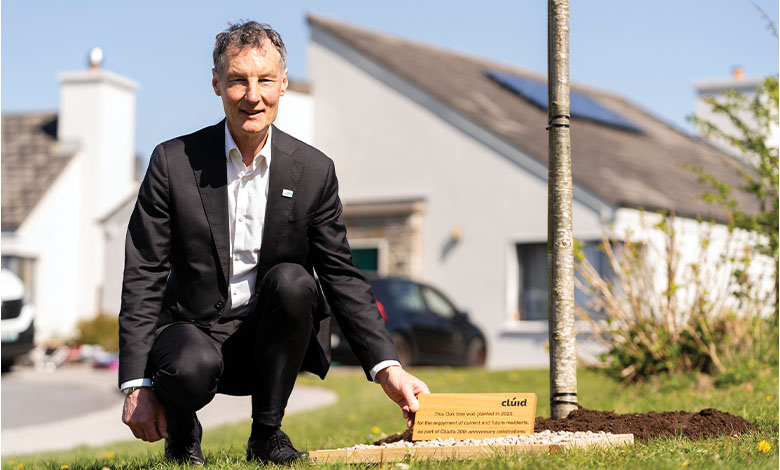Brian O’Gorman’s legacy at Clúid

2025 marks both the 30th anniversary of Clúid and the retirement of its Chief Executive, Brian O’Gorman. His departure represents a significant transition for the organisation and for the wider housing association sector in Ireland, which has grown substantially during his tenure.
Brian O’Gorman’s path into housing was not a straight line, but the sector became the consistent focus of his career. In the late 1980s and early 1990s, his work with Threshold placed him at the frontline of Ireland’s private rented sector.
He dealt with the fallout of rent de-control and rising mortgage arrears, issues that shaped his early understanding of how housing systems affect people’s lives.
A move to Focus Ireland followed, where he engaged more directly with policy and homelessness, broadening his sense of the challenges facing those excluded from secure housing.
After postgraduate study at Ulster University, O’Gorman joined St Pancras Housing Association Ireland in 1994 as its first employee. The association was later renamed Clúid, and its early years were lean: small schemes, limited resources, and a need to prove that non-profit housing associations could operate in an Irish context. Over the next three decades, Clúid grew into one of the country’s largest approved housing bodies (AHBs), today providing homes for close to 33,000 residents.
That growth was neither automatic nor guaranteed. Clúid’s first housing scheme in Kilcronan, Clondalkin, delivered in 1995, was a modest beginning but an important proof of concept. A more visible turning point came in 2002 with the acquisition of apartments at Clarion Quay through ‘planning gain.’
The deal was innovative at the time, and it demonstrated that social housing could be delivered through creative use of planning mechanisms.
The project is widely seen as having influenced the eventual establishment of Part V of the original Planning and Development Act, which required developers to provide a portion of new housing for social and affordable use.

In 2003, Clúid took on its first large-scale regeneration project: St Joseph’s Mansions in Dublin, later renamed Killarney Court. The scheme, undertaken with Dublin City Council, transformed one of the city’s most deprived flat complexes into modern social housing. The project also signalled growing trust in Clúid’s ability to manage complex developments and regeneration programmes. This period saw Clúid expand into specialist housing too, including its first age-friendly scheme in Killarney, which eventually led to the establishment of Clann, its dedicated age-friendly housing provider.
Through these milestones, O’Gorman’s leadership style emerged as pragmatic and focused on collaboration. He consistently emphasised the importance of partnerships, whether with local authorities, central government, lenders, or communities themselves, as the only way to deliver housing at scale. He was rarely a public showman, but those who worked with him often remark on his persistence and ability to bring together people from very different sectors to work toward a shared outcome.
At the same time, the challenges facing Clúid and the wider housing association movement have been considerable. Funding has remained a perennial issue, as AHBs balance their social mission with the realities of long-term financial sustainability. Housing associations are expected to provide homes not just for today but for decades to come, and managing that responsibility within tight margins has often been difficult. O’Gorman frequently pointed to the importance of treating housing associations as social enterprises, organisations that must cover their costs and reinvest surpluses in order to remain viable.
Reflecting on his career, O’Gorman says: “After 30 years with Clúid, I will be retiring this year. It has been a genuine privilege to have worked alongside so many extraordinary people and met so many remarkable residents and partners. I will miss being part of the next chapter but will be ‘cheering from afar’ as Clúid continues to flourish.”
His retirement comes at a pivotal moment. Ireland’s housing crisis remains one of the most pressing social issues of the decade. The Government has placed AHBs at the centre of its strategy to expand social and affordable housing, and Clúid, as the largest player, will inevitably be scrutinised on how it delivers. The scale of housing need, combined with ongoing affordability pressures, means the next phase for Clúid will be no less challenging than its first three decades.
O’Gorman leaves behind an organisation that has achieved significant scale, influence, and credibility. His legacy is not just the homes delivered but the role housing associations now play in Ireland’s housing system, a role that was far from assured when he started.





